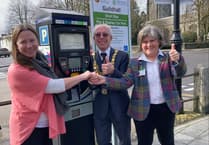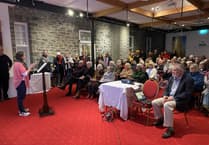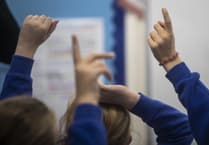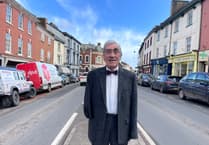THE influence of India, 'a brush with cancer' and nurturing of her children led Barbara McEwan to embrace the science of homoeopathy — a path she is enthusiastic for others to follow.
Originally from Canada, Barbara, now 35, left her homeland when she was 17, travelling to Europe, Israel and finally India where she met her husband.
The couple returned to England and Barbara began to study homeopathy, initially part-time to fit in with the demands of her growing family.
Her five-year course with the School of Homeopathy in Uffculme, North Devon, actually took ten years to complete — she is now a fully fledged, licensed member of the Society of Homoeopaths.
She said: 'I have always been interested in all forms of healing — I had this increasing desire to help people in a more tangible way.
'It was really with my own health issues and having my children that I developed a more serious interest.
'I had a brush with cancer about 13 years ago and I decided I had to make some choices for myself and that's when I became very interested in homoeopathy — it made sense to me.'
She set up her practise at home in Bridestowe a year ago and has been pleasantly surprised at how busy she has become.
'Since moving down here I have been really taken with how the community works and functions, and I want to be a vital part of that community — I think that's why I feel so passionate about giving something back.
'I have been quite amazed how local people have taken to it,' she said.
Barbara is keen to make homoeopathy accessible and acceptable to all.
'Homoeopathy is a very different process, it's very different from going to the doctor.
'It's more holistically-based. I will be very interested in a person's physical symptoms, but also what makes people tick, what goes on in their life, what significant things have caused them to make changes etc.'
Barbara said she cannot provide a 'miracle cure' — although sometimes just one treatment can have miraculous results.
'It's a system that's powerful, yet gentle. It's a process which works to strengthen the system, to allow you to swing with it,' said Barbara.
Initial consultations last a couple of hours, while she discusses the symptoms with her client, then delves deeper, to get the 'big picture'.
'I find out about their appetites, whether they have desires for certain foods — these things are very important because the remedies themselves also have a big picture,' she said.
'For instance, as a patient's tendency to develop headaches clears, they might find chronic constipation clears, they sleep better and feel more relaxed.'
Sometimes, Barbara prescribes a remedy immediately — sometimes she needs time to 'map out' patterns enabling her to relate remedies to the diverse needs of her client.
She feels the consultation process in itself is very powerful, allowing time for talk which can be so sadly lacking in a busy GP's surgery.
'I'm certainly not anti-doctor in any way, shape or form — I feel for doctors who have to cope with five-minute slots to treat people.
'I really feel homoeopathy can treat most things — I wouldn't pretend to be an accident and emergency unit though!
'If I suspected my children had meningitis, I would give them my own remedy and get them to the doctor — I suppose appendicitis would go along the same lines,' she said.
From children suffering exam nerves to cancer patients, Barbara said homoeopathy can help.
'With cancer, most patients tend to work with both homoeopathy and conventional medicine — homoeopathy can be very effective with side-effects like hair loss, loss of self-image etc — it really depends on the person and the stage at which they come to you.'
She said people tend to come to her when they feel they want to take control of their lives — her job is to match a remedy to help the process along.
Admittedly, it is difficult to see how extremely dilute forms of snake venom, dog's milk or plant extracts can work a cure — yet as Barbara pointed out, quinine comes from Peruvian bark, aspirin from willow — why not try the healing qualities of tarantula poison?
'I want to get across to people that homeopathy is an effective medicine which can be used for a wide range of illnesses both physical and mental,' she said.
Barbara's aim is to make homoeopathy more 'user-friendly' and accessible and to banish mystique and misunderstanding.
'I would love to get funding so I could properly provide low-cost treatment to people. I try to keep my charges low — I really wish I could charge nothing!,' she said.
During this week she has been 'in-store' at Tesco's in Launceston to talk to customers about her trade and at Holland and Barratt's in Exeter.
She will be at the Okehampton's Ockment Centre at 7.30pm tomorrow (Friday) to talk about homoeopathy and health. Admission is £2.50 — proceeds will go to the Travelling Homoeopathic Collective.



